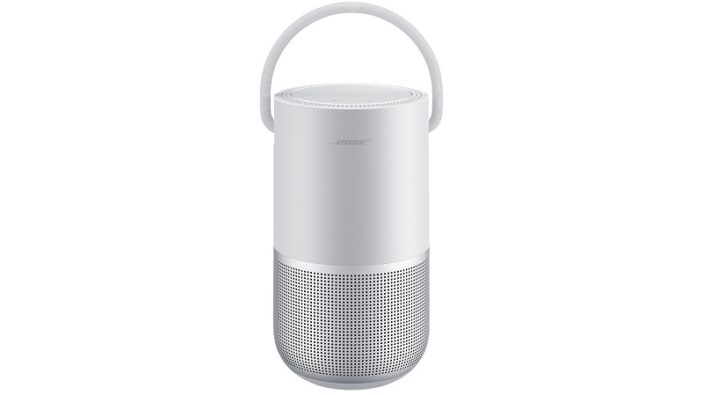
Bose’s SoundLink Micro is one of my favourite small speakers to date, so I’m always going to pay close attention when the reliable audio company plays in the portable space. More recently, that’s been with the bluntly named Bose Portable Home Speaker (BPHS) which is essentially a more powerful and thicker finesse of the popular SoundLink Revolve+. But with a $60 jump on its predecessor (based on JB Hi Fi prices), is it worth the bump?
Design
Bose has found its design niche and the team will be damned if they’re about to change it. The name has gone through a bigger transformation than the body here, with the Bose Portable Home Speaker looking like a more rounded and fully-formed version of the SoundLink Revolve line in either black or silver. You’ve got less of a narrow top, moving towards a more symmetrical design which just looks better and more sophisticated overall.
Its cylindrical, lightweight body stands at just 7.5-inches high and around 4-inches across, defined by a wraparound anodized aluminium and thick fabric-covered handle to reiterate portability. The bottom third has a wraparound grille covering a mono driver designed to pump out balanced 360-degree sound so speaker placement doesn’t matter too much.

At the very top you’ve got grille perforations encircling the control panel, protecting the exceptionally efficient microphone array which can pick up voice very well, even over the higher volumes.
Controls are as expected, neatly displayed with buttons for power, play/pause, and volume. Double-pressing play/pause skips to the next track, while three presses goes the other way. The other two buttons are for muting the mic when you don’t want the device listening to bring up either Alexa, Google Assistant or Apple Airplay 2, and one to switch between Bluetooth and Wi-Fi sources. Those who want to use this speaker for phone calls are out of luck, given there’s no built-in speakerphone function.
At 1.08kg, this thing is a breeze to carry around and is easily placed anywhere. A rubber base helps stabilise the upright body, so you don’t have to worry about this suddenly falling into the pool. Although you wouldn’t want it to; the IPX4 rating is definitely on the lower end of the spectrum when it comes to durability, so while minor spills and some splashes of rain will be no issue, this thing won’t deal well with being plunged into a body of water.
That’s a major mark of its use as an outdoor speaker, but the “Home” in its name should tell you that ruggedness wasn’t ever the intention to begin with. For perspective, the SoundLink Micro is IPX7 and a brilliant outdoor device.
Charging this thing is done via USB-C, fortunately, but the SoundLink’s audio jack is gone. You’ll have to contend with Wi-Fi and Bluetooth for this one, moving into a more modern space and shutting out AUX users.
Performance
Bose being Bose, there are no detailed specs but what you do get here is three passive radiators, a high-excursion driver, and a deflector, leading to quite confident assertion that this delivers deeper bass than any other similarly sized smart speaker. That is more or less accurate as long as you don’t push the volume up to the maximum. I can still get deeper bass at higher volume out of the Beoplay P6, but you won’t find many portable smart speakers that give a response like the BPHS.
You can connect the BPHS with other Bose speakers via the dedicated smartphone app and a Wi-Fi connection, but currently there’s no feature which let’s you create a stereo pair of two of these devices.
Still, just one of these speakers is enough to easily fill a medium sized room with a pleasant, natural soundscape. There’s a lot of clarity and vibrancy in vocals, particularly with softer folk songs, but more intensive and dense styles like electronica or sample-heavy hip hop do begin to degrade and lose detail at the higher volumes. The DSP works much better in the mid-range, where the bass is warm and punchy and the treble is crisp, resonating exceptionally well. Something like Sam Cooke or The National sounds beautiful on this.
Battery
Bose promise 12 hours of battery life for the BPHS. I’d say between 10 and 12 is a reliable range, with anything above 60% volume leaning towards the former. That’s still a very attractive battery, making this ideal for that outdoor BBQ we’re all looking forward to after this pandemic is over.
Value & Verdict
The Bose Portable Home Speaker is certainly impressive for its size. You can get a lot of volume out of this thing, but you will want to keep it modest if you want the best audio experience it can offer. The gorgeous design and genuine portability certainly help up its value, along with the overall voice assistant experience which is easily one of the best you’ll find compared to any similar speakers.
Design has made a few compromises though, the most obvious being the low IPX rating. You won’t want to take this camping as much as you’d want it around the house. But if you’re only using this poolside, or in the kitchen, then it’s very unlikely you’d be disappointed with the BPHS.
Does it justify the price though? $500 is steep for a speaker that gives you the ability to push for higher volumes, but doesn’t handle those higher levels as well as it should. Although there is enough power over the SoundLink+ that justifies the $60 jump.
If you’re already in the Bose ecosystem, and you need a new reliable portable speaker, you really can’t look past this.
![]()
![]()
![]()
![]()
![]()
FOUR STARS (OUT OF FIVE)
Highlights: Outstanding performance at mid-level volumes; genuinely portable with a comfortable handle; gorgeous design; exceptional voice assistant experience.
Lowlights: Low IPX rating; less impressive at higher volumes.
Manufacturer: Bose
Price: $499.95
Available: Now
